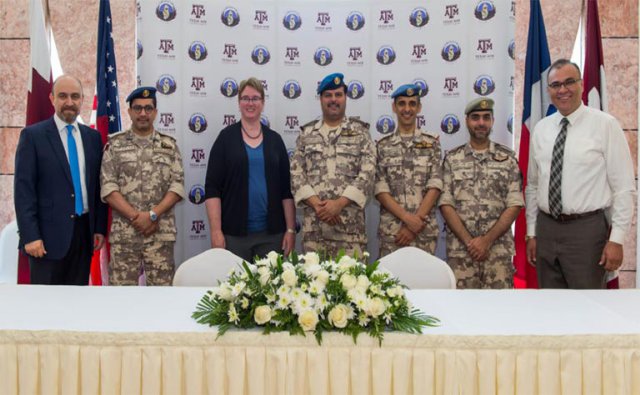and Qatar’s Reconnaissance and Surveillance Center (RSC) have signed a memorandum of understanding on 16 June to enhance collaboration and explore mutual opportunities for strategic partnerships.
The five-year agreement aims to provide scholarships and internships for engineering students at the branch campus; increase opportunities for custom-designed training and seminars to support the RSC’s operations and workforce; strengthen links between Texas A&M at Qatar and the Qatar Armed Forces to facilitate exchange of knowledge and expertise; and establish collaboration in research and discovery to support the center’s mission.
The center, which is part of the Ministry of Defense, protects Qatar’s borders and energy reserves, and participates in humanitarian and peacekeeping missions with its fleet of high-tech drones and unmanned aerial vehicles (UAVs). The technology is used for airborne surveillance needs in maritime border control missions and for supporting operations to secure Qatar’s hydrocarbon resources.
Signing on behalf of the RSC was center director General Khalid bin Ahmad Al-Kuwari, who said the new partnership represented a significant step forward in contributing to Qatar’s national vision of being a knowledge-based economy and helping to secure the continued safety and prosperity of the State of Qatar.
Al-Kuwari emphasized that a major aspiration of the Qatar Armed Forces was to develop capabilities to establish military-industrial structure to support the UAV program, which is a key project for the nation. Development of the drone platform started in 2014 and now is in advanced stages that require expertise in control systems, drone systems and software engineering, he said.
“Such projects rely on cooperation with prestigious universities that are proud to collaborate and exchange knowledge,” Al-Kuwari said. “Texas A&M University has engineering expertise that can be applied toward research, training and development necessary for the long-term success of our UAV program.” “Qatar has invested significantly in advanced drone technology to help secure our homeland and our valuable energy resources,” Al-Kuwari added. “Through our partnership with Texas A&M University at Qatar, we will work to develop the human capital and enhance the knowledge base needed for sustainable and effective deployment of these tools.”
The partnership grew out of the RSC’s contributions to the Engineering Heroes Drone Camp, a STEM program for Qatari students hosted in April by Texas A&M at Qatar and Maersk Oil Qatar. Al-Kuwari spoke with Qatari students who participated in the program and encouraged them to study hard to attain the knowledge needed to support technology for Qatar’s national defense, saying that engineering is a calling for Qatar. He and other officers from the RSC also gave the students a preview of drone technology recently adopted by Qatar’s military forces.
Dr. Ann L. Kenimer, interim dean of Texas A&M at Qatar, said the new partnership represented the essence of what Texas A&M at Qatar strives to be: a valued resource to Qatar. “By partnering to share knowledge, conduct research and provide training in leading-edge technologies such as drones, Texas A&M at Qatar and the Reconnaissance and Surveillance Center are directly supporting human capacity-building, economic development, and the safety and security of the State of Qatar,” Kenimer said. “We look forward to expanding this collaboration with our partner, the Reconnaissance and Surveillance Center, and to the opportunities this partnership provides to our students and our faculty and staff researchers.”(QNA)


Hello
We are a research team that has been working on drones for five years
And a method to increase the flight time of multi-rotors.
The method of multi-rotor propulsion for 3 hours